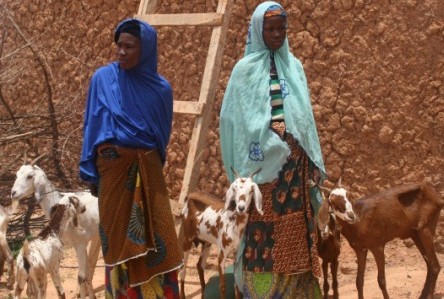Speeches Shim

The vast majority of Nigeriens rely on subsistence agriculture and the region’s frequent droughts lead to poor harvests and regular food shortages. Chronic food insecurity and infectious disease have resulted in some of the highest rates of malnutrition and mortality in the world. As of January 2015, United Nations estimates placed Niger’s food-insecure population at nearly 3.4 million people. Over 40 percent of Nigerien children under 5 years old are chronically malnourished and the country’s 14.8 percent rate of global acute malnutrition exceeds the World Health Organization’s threshold of serious concern of 10 percent.
PROGRAM OVERVIEW
USAID’s resilience programming in Niger seeks to address the underlying causes of vulnerability and risk, which lead to a cycle of humanitarian crisis and response whenever climatic or other shocks occur. USAID’s Resilience in the Sahel Enhanced (RISE) initiative aims to end this vicious cycle and help the Sahel’s vulnerable populations stay firmly on the path to development. USAID’s Office of Food for Peace and Office of U.S. Foreign Disaster Assistance programming targets the most vulnerable with life-saving interventions, which include activities such as direct food provision through the World Food Program as well as cash transfers, temporary employment opportunities, improved access to seeds and training in more effective livestock and agricultural practices.
Resilience Goals
Reduced malnutrition in targeted areas
Reduced vulnerability and need for humanitarian assistance
Reduced food insecurity through increased food and water availability and improved livelihoods
Improved productivity in agriculture sector and livestock industries
Increased representation of women in food and nutrition activities at community level
At the same time, USAID’s development programs support Niger’s longer-term food security and agriculture development objectives, addressing the root causes of persistent vulnerability. These multiyear, multi-sectoral programs increase sustainable economic well-being through increased agricultural productivity, income diversification and increased access to markets and financial services. RISE also seeks to improve health and nutrition and strengthen institutions and governance critical to resilience in areas such as natural resource management and mitigation of resource-related conflict. RISE activities are implemented through an approach aiming to expand institutional, household, and individual capacity to adapt to and recover from stresses; and improve nutrition, health and well-being of vulnerable populations. Finally, the Sahel Resilience Learning project helps bring all of these efforts together by evaluating the impact of RISE projects; promoting collaboration across government, donors and programs; and facilitating learning in order to better guide resilience interventions in the Sahel, while developing appropriate adaptive capacities of communities and partners.

Comment
Make a general inquiry or suggest an improvement.